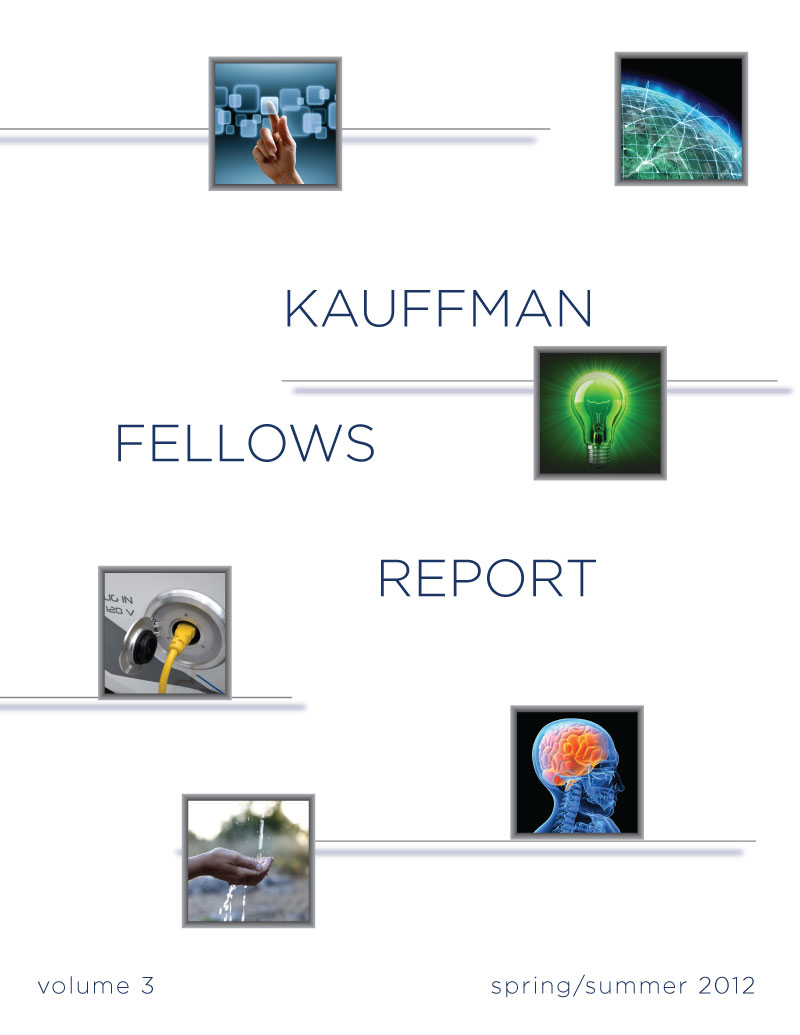Introducing Inspiring Winter Reading

Phil Wickham, Charter Class
2012 is setting up to be a fascinating year full of highly watched events. Not only did the 'Niners make the playoffs, but the Mayans apparently predicted the end of the world this coming December 21. New agers interpret this Mayan "end of calendar" event as good news that humanity might enter a more positive and enlightened state. (Then again, the Mayans did not after all predict their own demise.) For the more science-minded, the Mayan end of the world is just in time for the end of the Kyoto Protocol, which expires December 31. There are also planetary collisions and polar shifting on the 2012 docket.
What we at the Center for Venture Education are watching more closely is an important and real chain reaction encompassing markets, policy, and education. Increased transparency has helped identify economic weakness and flaws all around the world, and the solution—in the form of economic resurgence—must be driven by innovation. Innovative ecosystems are in turn driven by entrepreneurs, and those entrepreneurs must have access to high quality capital formation. In turn, capital formation must be driven by investors who understand entrepreneurs' needs and help them connect to insights, opportunities, and resources around the world. For the most part, though, entrepreneurs lack access to this kind of capital formation—and as a result, innovation is stalling.In our 2011 issue (volume 2), I wrote about the history and vision of the Kauffman Fellows Program that predated our 1995 launch. Our founders at that time somehow perceived this capital-formation pain across the entire ecosystem, and in the past four years we have moved aggressively to address that lack, expanding on many axes. The Society of Kauffman Fellows is now represented in 40 countries, and we look to proactively include a broad variety of investment platforms across model, stage, and sector—provided they are committed to enhancing the success and connectivity of start-up management teams. These include platforms in venture, angels, government and university seed, corporations, and impact investing.The demand for the Kauffman Fellows Program has grown at nearly unmanageable rates, driving unprecedented growth in class size and geographic reach. The Charter Class graduated 13 Fellows in 1997 (all from U.S.-based venture capital), while Class 16 is on track to graduate 39 Fellows from a broad spectrum of organizations (with quality applicants and demand sufficient for that class to have been 50 percent larger).Growth brings its challenges, but the very good news is that (a) we have more remarkable people each year and (b) the arithmetic of the peer-support dynamic, at both the class and Program level, is radically more powerful. Fellows inspire and support each other, and we struggle to find another organization that impacts global capital formation on the scale of the Kauffman Fellows Program. Today, at least 56 Fellows have launched new investment vehicles addressing under-served markets. Many have launched ground-breaking corporate and policy platforms that are models for the rest of the world, and 72 Fellows actively serve in our global Impact Investors Special Interest Group (SIG), founded and headed by Jocelyn Brown of Class 13. These breakthroughs are the crux of our intellectual property, and we must do all we can to capture and codify them, when possible and permissible.All of this supports our decision to expand the Kauffman Fellows Report to two issues a year so that we can capture all of the innovation in capital formation that is pouring out of the Program and the Society of Kauffman Fellows. Our goal is for this journal to be a platform for your stories, so we encourage Fellows and Mentors to submit ideas for publishing.The focus in this new issue is much the same: to highlight the remarkable breadth of Fellows' leadership and impact around the globe. Aziz Gilani of DFJ Mercury makes a compelling case for the competitive advantage of investing in the U.S. heartland, and Jorge Torres outlines the pitfalls and opportunities that accompany the disruption of the IP markets. Taro Sato, Daniel Heaf, and Justin Fishner-Wolfson provide three examples of new investment funds that Fellows are creating around the world. Kiki Tidwell dives into the potential of the venture asset class for foundation mission investing, while Clint Korver demonstrates how advanced decision-making sciences are beginning to penetrate mainstream venture investing at the ground level. Finally, Raj Kundra and his colleague Rob Katz lay out the drivers behind d.light's success, proof that impact at the Base of the Pyramid can generate market returns. One new feature in this volume is a "tombstone" announcing the recent financing of a Fellow-founded fund; expect to see more highlights of funds and companies launched and led by Kauffman Fellows in future volumes.Most importantly, the articles presented here are neither just academic research nor novel theories—they are stories of actual leadership being demonstrated by Kauffman Fellows, with a pattern of providing service and product platforms to underserved markets. This issue demonstrates in real time how the Society strives to keep pace with a rapidly evolving global entrepreneurship ecosystem.On behalf of the authors and Anna, our Managing Editor, we hope you find these new articles insightful and applicable to your day-to-day work in innovation. Please feel free to reach out with suggestions and feedback.

Phil Wickham
Phil is President and CEO of the Center for Venture Education. Phil was in the Charter Class of the Kauffman Fellows Program, serving his fellowship under Ed Kania at OneLiberty Ventures in Boston, and was founding Vice-Chairman of the CVE Board. Prior to joining the CVE staff, Phil served as a General Partner at JAFCO America Ventures and at Copan, based in Munich, Germany. In his venture career, Phil made over 30 investments, including Ikanos, Web Methods, Com21, Emergent, and Trilibis. Phil received his BS from the University of Arizona and his MBA from Rensselaer. He serves on the board of the nonprofit SVASE (Silicon Valley Association of Startup Entrepreneurs) as well as on the boards of Trilibis and S2 Technologies.





